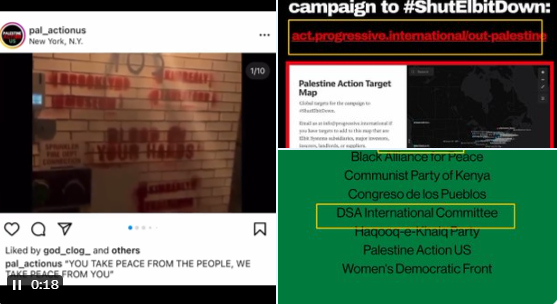|
Getting your Trinity Audio player ready...
|
Pro-Hamas Group that Vandalized Home of Bklyn Museum Director Vows to Return for More
Edited by: Fern Sidman
In a recent and alarming escalation of tensions, the homes of the Brooklyn Museum’s director and several board members became the targets of anti-Semitic vandalism by the pro-Hamas group, Palestine Action US, according to a report on Thursday in The New York Post.
Palestine Action US’s Instagram post conveyed a stark and menacing message: “YOU TAKE PEACE FROM THE PEOPLE, WE TAKE PEACE FROM YOU. WE WILL BE BACK,” as per the information provided in The Post report. This statement, combined with the footage of the vandalism calls attention to the group’s intent to intimidate and harass individuals they perceive as supporting Zionism and Israeli policies. The group’s rhetoric and actions reflect a broader narrative that conflates legitimate political critique with anti-Semitic tropes and violence.
7 months ago I wrote about how Fergie Chambers planned to “making people who support Israel actually afraid to go out in public.”
It seems the group he funds, Palestine Action US, did just that this week: https://t.co/DAX05Xk45Yhttps://t.co/INZ0Onzni0
— Suzy Weiss (@SnoozyWeiss) June 13, 2024
On Tuesday night, masked agitators defaced the homes of Brooklyn Museum director Anne Pasternak and other museum leaders. The vandals sprayed blood-red paint across the front of Pasternak’s home and hung signs labeling her a “white-supremacist Zionist” and complicit in genocide. The attack didn’t stop there; the perpetrators marked the front doors with inverted red triangles, a symbol associated with Hamas to signify Israelis marked for death, according to The Post report. These actions were captured on video and shared on social media by Palestine Action US, accompanied by a threatening message and a pro-Palestinian hip-hop soundtrack.
7 months ago I wrote about how Fergie Chambers planned to “making people who support Israel actually afraid to go out in public.”
It seems the group he funds, Palestine Action US, did just that this week: https://t.co/DAX05Xk45Yhttps://t.co/INZ0Onzni0
— Suzy Weiss (@SnoozyWeiss) June 13, 2024
The use of such inflammatory symbols and language is deeply concerning. The inverted red triangle, historically used by the Nazis to identify political prisoners and now repurposed by Hamas, is a potent symbol of hate and violence, as was explained in The Post report. Its use in this context not only targets individuals but also perpetuates harmful stereotypes and incites even more dangerous manifestations of anti-Semitism.
The Brooklyn Museum, like many cultural institutions, often finds itself at the nexus of political and social debates. Palestine Action US’s statement that the museum is “an institution tainted with the blood of our martyrs” and “a nexus of Zionism, Imperialism, and settler-colonialism” illustrates how cultural spaces can become platforms for the most egregious forms of Jew hatred. This rhetoric aligns with a broader trend in which cultural and academic institutions are increasingly targeted for their perceived political stances or affiliations.
Palestine Action US, an American offshoot of a UK-based organization, is not believed to have directly committed the vandalism. However, the report in The Post indicated that the group plays a significant role in disseminating anti-Israel propaganda and supporting pro-Hamas protesters. Its social media presence is marked by reposting and amplifying content that aligns with its anti-Israel stance.
The group has claimed credit for numerous high-profile protests. Among these is the notorious slashing of a 1914 Trinity College portrait of Lord Arthur James Balfour, the British statesman behind the Balfour Declaration, which is often cited as a foundational document for the establishment of modern Israel, according to the information provided in The Post report.
Palestine Action US is also part of a broader network of similarly aligned groups that engage in various forms of protest and activism against Israel. The relationship between these groups and direct actions, such as the vandalism at Brooklyn Museum leaders’ homes, remains ambiguous. The Post report explained that while there is no clear evidence that Palestine Action US organized or participated in such protests in the US, its role in propagating a narrative that equates support for Israel with complicity in genocide and white supremacy is clear.
The targeting of the Brooklyn Museum and its leaders reflects a growing trend where cultural and academic institutions are drawn into the crossfire of geopolitical conflicts. The museum, accused by Palestine Action US of being complicit in a fallacious narrative of Palestinian genocide, symbolizes for the group a spurious nexus of Zionism, imperialism, and settler-colonialism. This rhetoric fuels a political line that conflates institutional affiliations with broader political agendas, often leading to acts of intimidation and violence.
The response to these actions has been one of widespread condemnation. Community leaders, politicians, and members of the Jewish community have denounced the vandalism as a hate crime. These acts of intimidation and virulent anti-Semitism are not only criminal but also undermine the principles of peaceful protest and dialogue. The fear and insecurity instilled by such actions have far-reaching consequences, not just for the individuals targeted but for the community as a whole.





